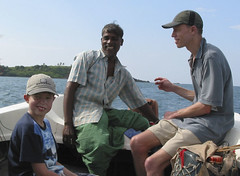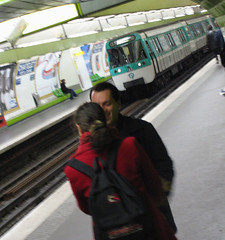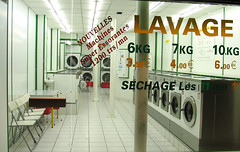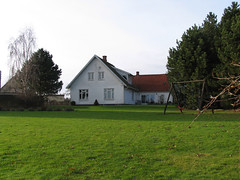Thursday, January 27, 2005
Clinton, Gates, Bono, Blair, Mbeki, Obasanjo - on stage together
you oughta hear this. 27 minutes, 15 of them rock. A weird mix of very clever people who care, sharing the stage talking about how to avoid incomprehensible suffering. At Davos, where the people who are supposed to rule earth have gathered.
Rock star Bono and Clinton are both amazing communicators.
Here's Bono telling about talking to Tom Lantos, an originally hungarian politician and democratic member of congres, who was put on the trains to a hungarian concentration camp. He told Bono of his experiences, of what it was like to deal with the holocaust as a child.:
"He told me that the thing that haunts him later on in his life more than anything was, as a child, the looks of the faces of the people who stood by and watched them be loaded on the trains – the passersby, just the people who stopped . They saw these families being put on trains and they didn’t ask where they where going.
Well, I asked him – and it was a very hard thing to do to someone who has had that experience – is there anything analogues to this [the global development and poverty issues] here?
And he said yes, there is, but here we know where the trains are going. We know that these people are going to die from lack of drugs that you can get in any corner shop, we know that people are going to die because of a mosquito bite when they shouldn’t.
And Bono replied to him that whenever he spoke about this, he would say that we, this time, are going to lie in front of the trains".
Nigeria's president Obasanjo points out very clearly how our security - the rich man's security - is directly dependent upon the poor man's security:
"You cannot really talk about security without talking in military terms or in the absence of violence and conflict terms without talking about security in terms of food, in terms of employment, in terms of education, in terms of health".
And here’s Bill Clinton, speaking about the lack of funding for combating disease:
"This is cheap. Let’s get real: The president just asked for 80 billion dollars for the Irak war – for a year. For a pittance of that we could double Americas international assistance. It’s cheap!".
And while we're at it. There's a one hour conversation with Bill Clinton, you cannot turn away:
World Economic Forum - Webcasts
World Economic Forum - Webcasts
Nice. I would love to go to Davos, but like Chirac, my helicopter couldn't make it. Luckily, I can simply watch the videos of all the speeches. It's cheaper, too.
Tuesday, January 25, 2005
Nice and cold

snemand_700
Originally uploaded by Peter Hesseldahl.
Snow at last. I used to dread the cold, but these days some frost and snow is reassuring, there's still some elements of winter left.
In Denmark this january was the warmest recorded. Brrrr... chilling.
Sunday, January 23, 2005
Toward a Literacy of Cooperation
Not for everyone perhaps, but if new forms of cooperation, social software, smartmobs, prisoners' dilemma or the tragedy of the commons sounds like important topics, well, check out this course at Stanford.
Howard Rheingold of "smartmobs" fame and Andrea Saveri from the Instititute of the future have put together a string of great speakers - streamed to you in glorious video weekly.
Knark Mopfler
I've spent many hours playing along with my Dire Straits and Knopfler records. Knopfler's solo albums are a mixed lot. Seems that about half of the songs are really great, while the other half are forgettable. His latest album, Shangrila, is the best since "golden heart". My favorites are the odd numbers: 3,5,7,9,11 - and not least 13: Donegan's gone.
Yeah, Lonnie Donegan, glad to hear to someone knows about skiffle. (Skiffle...?)
The defining moments of globalization

dayasena2
Originally uploaded by Peter Hesseldahl.
Globalization has its defining moments where we realize that we have been connected and experience and participate in global events in ever more direct or immediate ways: The pictures of earth from space, Live aid, the bombing of Bagdad in the first Gulf war, and 9/11, of course,
Our family spent six weeks in Sri Lanka last year, a good part of them along the wonderful southern coasts that have now been devastated by the tsunami. Naturally, this disaster seems much closer and understandable to the many people who have been to the affected areas.
It gets personal. We met this guy, Dayasena, a fisherman, while my son and I were having a haircut in a local barbershop. We had some great discussions and a wonderful day out on his boat. We knew he lived very close to the ocean so we have been worrying a lot about him and his family. We wrote him but didn't really believe that a letter could be delivered, considering the mess, we've seen on pictures. But, we just got a letter back from him - amazing. His boat has been wrecked, but his house happens to be on a small hill so it was safe.
Now we have to figure out how to get some money down to him.
Thursday, January 20, 2005
Ze Metro

metro
Originally uploaded by Peter Hesseldahl.
Ah, Paris. The particular smell of the Metro. Stirs up long forgotten episodes from weird youthful trips. Romantic, ultra low budget, I could even speak French then (well, more so than now, at least)
If you want to help - get out of the way
Things are progressing. The World Bank estimates that the number of people living in extreme poverty dropped from 1.5 billion to 1.1 billion between 1981 and 2002. But obviously, this was mainly due to China, India and other Asian countries bootstrapping their economies – not because of well meaning advice from the development community.
Over lunch, in splendid French diplomatic settings, Inge Kaul, director of UNDP office of development studies, was kind enough to explain her philosophy to me – and it seems that her line of thinking is indicative of where development efforts may be heading.
"Get out of the way. Don’t go and tell the developing countries what they should do". In stead of investing in imposing our solutions on them, we should remove the obstacles and shackles that make it so hard to move forward.
The enormous agricultural subsidies for EU and US farmers severely distort world market prices and makes it hard for local farmers to compete even in their own region.
The debt burden from past ill advised and corrupted development programs means that a country like Zambia spends 5 times more on paying back loans than on health – in the middle of a ravaging AIDS epidemic.
In short: At the moment we’re insisting that a significant part of the taxes collected in the developing countries are used to pay back loans to the rich countries, we are subjecting their industries to unfair competition in the very market we tell preach that they should enter – and when we generously donate, it’s usually in the form of programs that do what we feel should be done.
Hmmm…
Yeah, shocking
UNDP annual forum, hosted by the French foreign ministry. Mark Mallotch Brown, coordinator of the UNDP (and just named chief of staff for Kofi Annan) talks about the "silent Tsunamis".
Yes, the Tsunami in the Indian Ocean claimed 150.000 lives so far, but:
Every day 6000 people are killed by HIV/AIDS – and another 8.200 are infected.
Every 30 seconds an African child dies of malaria – it adds up to more than a million child deaths a year
Every hour more than a thousand children under five die from diseases linked to poverty – the equivalent death toll of two tsunamis pr. Month.
...Yeah, yeah, you’ve heard it. We all know. It just churns somewhere in the background. Doesn’t make it in the news, somehow. Too dispersed, too ordinary.
For me, and appearantly to many others, the tsunami was a very clear demonstration of how humanity has become closer connected. Many of us outside the disaster area have been there as tourists, we know people there, we have the "before" pictures in our photo albums.
But clearly the One World feeling doesn’t extend everywhere. For one, sub Saharan Africa is clearly not in yet.
Saturday, January 08, 2005
Thorvaldsens Venus (plus photoshop)

venus hoved_7
Originally uploaded by Peer Hesseldahl.
Raced through Thorvaldsens Museum in Copenhagen the other day for some raw material to play around with. This is what I came up with - a pale imitation of Warhol, I know, but in fact inspired by my old friende Michael Holmstrøm.
Stormy weather
DR Nyheder Online - Vejret - Orkan rammer Jylland
TRUST UNCERTAINTY! – A MINDSET FOR CHANGE
nynatur

